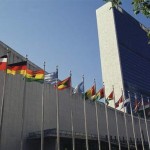UN Recognizes Wildlife Crime as Threat
Poaching and the illicit trafficking of wildlife products were raised on the floor of the United Nations General Assembly for the first time this Monday, during discussions on strengthening national and international governance.
World leaders gathering in New York for the global body’s 67th annual meeting highlighted wildlife trafficking along with other severe threats to the rule of law such as corruption and drug running.
In a written statement, permanent Security Council member United States highlighted “the harm caused by wildlife poaching and trafficking to conservation efforts, rule of law, governance and economic development.” The rapidly-growing illicit international trade in endangered species products, such as rhino horn, elephant ivory and tiger parts, is now estimated to be worth $5 billion per year globally.
“Such organized crime is increasingly affecting the environment and biodiversity through poaching and illegal fishing,” Gabon’s President Ali Bongo said during the High-level Meeting on the Rule of Law. “Gabon intends to strengthen its criminal justice system to combat this phenomenon. But such efforts will require a greater international legal cooperation.”
“Governments have made a significant step forward by introducing the issue into this important forum on the rule of law. We now call on all them to increase their law enforcement responses to wildlife crime on a commensurate basis.”
Roland Melisch, Director of TRAFFIC’s Africa & Europe programmes said: “Good governance is essential to prevent crimes such as illicit wildlife trafficking. Countries need to be held accountable to their commitments under relevant United Nations treaties.”
WWF and its partner TRAFFIC, the wildlife monitoring network, are campaigning for greater protection of threatened species such as rhinos, tigers and elephants. In order to save endangered animals, source, transit and demand countries must all improve law enforcement, customs controls and judicial systems. WWF and TRAFFIC are also urging governments in consumer countries to undertake demand reduction efforts to curb the use of endangered species products.
